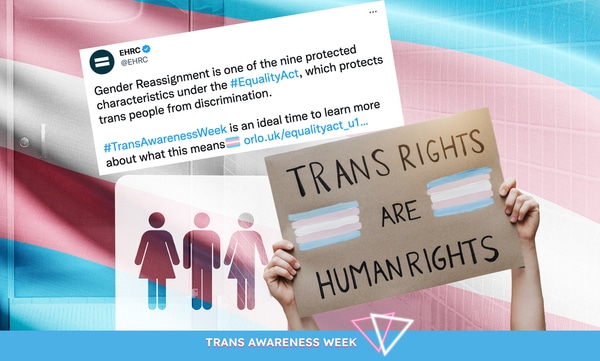EHRC: Equalities watchdog accused of ‘gaslighting’ over Trans Awareness Week post

Trans activists have slammed the “genuinely shameful” EHRC tweet.(Twitter/Getty/@EHRC)
The Equality and Human Rights Commission (EHRC) has been accused of “gaslighting” over a Trans Awareness Week post.
The EHRC is supposed to be the UK’s independent equalities watchdog. But its reputation among the LGBTQ+ community has been tarnished by repeated interventions on trans rights, including its attempt to halt gender recognition reform in Scotland and the publication of guidance on excluding trans people from single-sex spaces.
It’s why the EHRC has been ridiculed and criticised over a Sunday (13 November) tweet commemorating the beginning of Trans Awareness Week, directing followers to “learn more about” how trans people are protected under the Equality Act.
Gender Reassignment is one of the nine protected characteristics under the #EqualityAct, which protects trans people from discrimination.#TransAwarenessWeek is an ideal time to learn more about what this means?️⚧️ https://t.co/5VPllWwKtk pic.twitter.com/58UaDCDazg
— EHRC (@EHRC) November 13, 2022
“Honestly, you are the last people on earth that I want highlighting Trans Awareness Week after the hate, stress, and upset you have given the trans and non-binary community over the last year,” Trans in the City CEO Bobbi Pickard wrote.
Others, including trans activist Felix Fern and Good Law Project director Jo Maugham, described it as an attempt at “gaslighting” the LGBTQ+ community. Gaslighting refers to manipulating someone as so to make them question their own reality.
“Why have two former EHRC legal directors publicly criticised you for your attacks on trans rights?” said Maugham. “Unless you grapple with their criticisms, your bland tweet will read like what it is.”
A mixture of leaked documents, unpublished guidance, and explicit statements by members of the organisation have shown that the EHRC has, on a number of occasions, attempted to exclude trans people from single-sex spaces.
In 2021, an “unpublished guidance pack” that was leaked to Vice World News detailed proposed suggestions to bar trans people from single-sex spaces unless they hold a Gender Recognition Certificate (GRC). It’s believed that less than one per cent of trans people hold a GRC, and the EHRC itself admitted in October 2022 that asking for a GRC could break the law.
The EHRC made the admission in a recent intervention on Scottish GRA reform. Scotland wants to make it easier for trans people to access legal recognition by removing the need for a medical diagnosis, moving towards a system of self-determination, but the EHRC has vocally opposed the plans.
A bill on reform passed its first vote 88-33 in October, with polling suggesting widespread public support.
In response to the backlash, a spokesperson for the EHRC said: “We were set up by Parliament to protect everyone’s rights in Britain. This includes the rights of trans people.
“Our job is also to explain the law, which, in relation to sex and gender issues, can be complex. We issued guidance on single-sex spaces so that service providers can meet the needs of all their users, including trans people.
“In all our activity we uphold fairness for all, with our work based on evidence and the law.”
TransActual criticises the EHRC for its past actions on trans guidance
LGBTQ+ advocacy group TransActual told PinkNews that the organisation had “been neutered to the point where it has little… to contribute to any discourse on these topics”, pointing to appointments made by then-equalities minister Liz Truss to its board, including installing Kishwer Falkner as chair.
In her first interview after becoming chair of the commission, Falkner said the EHRC was determined to protect “freedom of belief”, including “gender critical” beliefs, and that it is “entirely reasonable” to question trans people’s gender identity.
TransActual chair Helen Belcher said: “What was once an organisation dedicated to equality and human rights has, courtesy of a government that believes in neither, been neutered to the point where it has little meaningful to contribute to any discourse on these topics.
“There are continuing fears within the trans community that for all the public-facing goodwill, the EHRC is still working on proposals that would make life unliveable for trans people in the UK.”
On the same day that 20 groups, including Stonewall, petitioned the UN-affiliated Global Alliance of National Human Rights Institutions (GANHRI) to review the EHRC’s status, the watchdog published further guidance to essentially exclude trans people from single-sex spaces.
The 4 April report was slammed by several advocacy groups as “appalling and harmful”, and said that banning trans people from single-sex spaces could be done if there is a “good reason based on evidence,” while citing several examples that it deems appropriate.
Several of the examples cite single-sex toilets and changing rooms, as well as gender-specific fitness classes “because of the degree of physical contact involved.”
In response, Gendered Intelligence said in April that the commission had “failed in its duty to independently advocate for equality and human rights.”
“The vast majority of businesses, organisations and establishments have no interest in excluding trans people, and we must not let our public lives be impacted by the actions of a few powerful individuals.”
GANHRI renewed the EHRC’s ‘A status in October.

